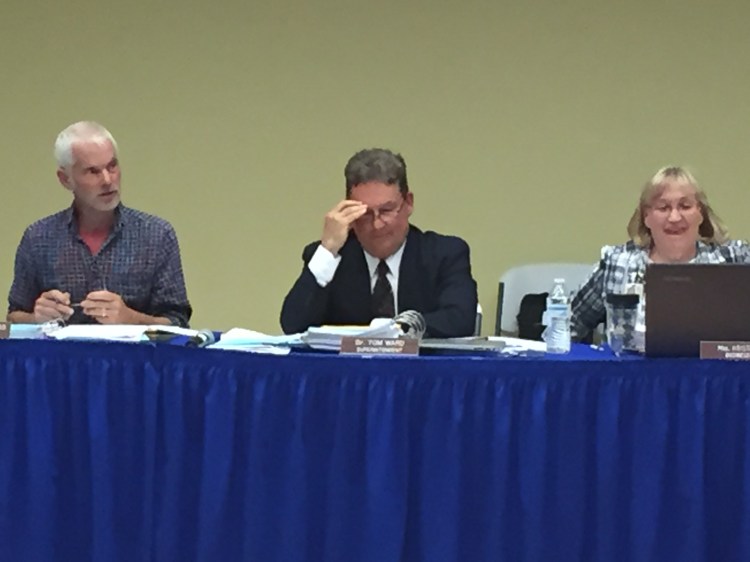FARMINGTON — The Regional School Unit 9 school board identified $173,839 in budget savings Tuesday in a second meeting held to discuss cuts to what the board called an already tight budget.
The initially proposed $32.25 million budget — up $1.2 million from the previous year — was rejected in a June 9 districtwide referendum.
“This district has historically been very frugal,” Superintendent Tom Ward said at the first meeting, noting that many line items haven’t had significant increases over the years. The district includes Chesterville, Farmington, Industry, New Sharon, New Vineyard, Starks, Temple, Vienna, Wilton and Weld.
Still not ready for a vote, the board will meet again Tuesday to attempt to put together a budget to set before the voters.
In all, $5,000 was taken from the music general supplies budget; $6,824 was removed from library books, periodicals and technology; and Foster Tech co-curricular field trip money was dropped to the tune of $2,153.
The board was poised to cut $36,252 from laptop insurance fees, only paying those fees for students eligible for free lunches; but in the end it agreed it should be an all-or-nothing issue. The school will continue to pay for all laptop insurance.
Another potential cut that received a reprieve was delaying the hiring of one Cascade Brook School teacher. The original budget had allotted two teachers until the first round of suggested cuts put one position on hold.
In the end, it was decided to fill both positions, as one teacher in the room said the third-grade class moving up this year is particularly needy and class size will help determine their success in the years to come.
A special-education contingency fund was cut by $25,000, and the volunteer coordinator’s job was reduced to a half-time position, saving the district another $28,000.
Other cuts included the middle school show choir, guidance, substitute teachers and shifting some custodial costs to the lunch program budget.
Ward said that the next public meeting on the budget will take place at 7 p.m. Thursday at Mt. Blue High School, where he hopes to set the new budget for a future vote. A date for that vote hasn’t been set yet.
Overall, the board on Tuesday identified $230,136 that possibly can be stripped from the budget, including $152,118 in delayed hiring for teacher positions, $36,506 for laptop insurance and $28,613 in heating oil savings. But Ward said the oil item won’t give the district much leeway if it finds itself in the middle of another long, cold winter.
The laptop insurance of $72 per student, which was paid for all students, now might be paid for only lower-income students if the cut is adopted.
One of the bigger unexpected costs, according to Ward, is the rise in special education expenses, especially out-of-district placements. Special education law mandates that every child receive a free and appropriate public education in the least restrictive environment. Often the needs of a child are such that they can’t be met in the public school setting, necessitating special school placements.
The district has proposed three-day treatment programs within the schools to prevent some of those placements. One student in the district now is placed outside the district, at a cost of $50,000.
Ward said out-of-district placements can cost $50,000 to $100,000, and that last month he heard of a Damariscotta out-of-state placement that cost that district $300,000.
“Anything we can do to keep as many of our students with handicapping conditions in our own district saves us a tremendous amount of money. Actually, it saves us over $500,000 a year,” Ward said.
“The other side of that is it’s good to keep these kids in their homes, right in their communities, in their home schools so that they don’t have to spend an hour, two hours each way to be transported every day,” he said.
Ward said that the current out-of-district placed student might not be a permanent situation and that the district will continue to work to be able eventually to provide programming for that student. “Just because they are in out-of-district placement, we don’t just forget about them,” he said.
Other discussion Tuesday night revolved around not hiring as many special education staff members as proposed, instead having some special education students spend more time in regular education classrooms to free time for current special educators to write Individualized Education Plans and otherwise tend to their increased caseload.
Send questions/comments to the editors.


